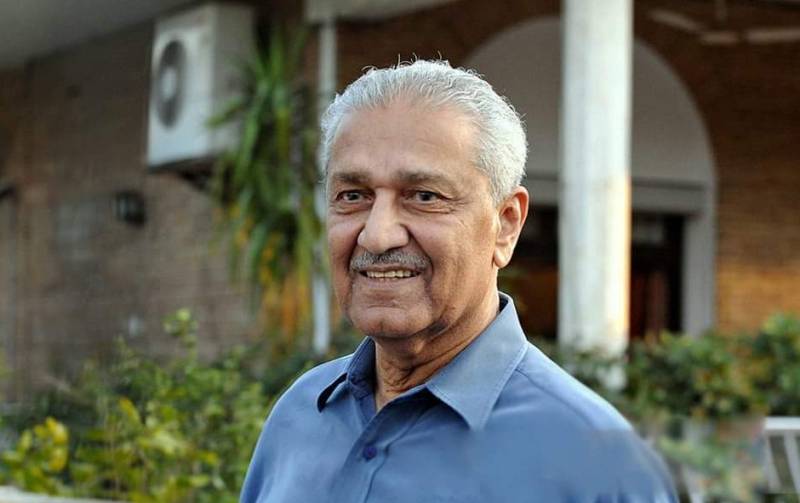Mohsin-e-Pakistan Dr. Abdul Qadeer Khan has departed for his eternal abode on Sunday after his health declined and he was shifted to ventilator support.
The family of the iconic nuclear physicist has confirmed the passing, saying he had been in a very critical health condition and was shifted to the ICU.
After contracting COVID earlier, Khan had recovered but since last night his health suddenly deteriorated and he was shifted to KRL Hospital’s ICU.
His funeral will be offered in the Faisal Mosque later today, the family said.
Deeply saddened by the passing of Dr A Q Khan. He was loved by our nation bec of his critical contribution in making us a nuclear weapon state. This has provided us security against an aggressive much larger nuclear neighbour. For the people of Pakistan he was a national icon.
— Imran Khan (@ImranKhanPTI) October 10, 2021
Several functions will be held to mark the life of the globally acclaimed nuclear scientist of Pakistan.
In 1936, Khan was born in Bhopal, India, he later migrated along with his family to Karachi.
Khan received his early education from Karachi’s DJ Science College, then in 1961, he went to Europe for higher studies and earned his PhD degree from the universities of Germany and Holland.
Dr. Abdul Qadeer approached the then Prime Minister of Pakistan Zulfiqar Ali Bhutto in 1974 and informed him about his expertise in the challenging process of Uranium enrichment through which Nuclear energy is acquired.
Qadeer offered to serve Pakistan with his capabilities and Bhutto immediately asked him to return to his country.
Planning and Development Minister Asad Umar said that Dr Khan had played an important role in making the country "invincible". He also offered prayers for the deceased.
Born in 1936 in Bhopal, India, Dr Khan had immigrated along with his family to Pakistan in 1947 after partition of the subcontinent.
After learning of India's nuclear test in 1974, he had joined his nation's clandestine efforts to develop nuclear power. He had founded the Khan Research Laboratories in 1976 and was its chief scientist and director for many years, according to Radio Pakistan.
He was awarded the Nishan-i-Imtiaz for his services to the country.
In 2004, Dr Khan was at the centre of a massive global nuclear proliferation scandal in 2004. In a series of dramatic developments, he was accused by then army chief and president Pervez Musharraf of running a rogue proliferation network for nuclear material.
Shortly after Musharraf’s announcement, a recorded confession by Khan was aired in which he took sole responsibility for all the nuclear proliferation that had been revealed.
According to a statement issued by the Inter-Services Public Relations (ISPR), Chairman Joint Chiefs of Staff Committee General Nadeem Raza and all services chiefs expressed sorrow over Dr Khan's passing.
The ISPR statement also quoted Chief of Army Staff General Qamar Javed Bajwa as saying that he had rendered invaluable services to strengthen Pakistan's defence capabilities.
Leader of the Opposition in the National Assembly Shehbaz Sharif said that the nation had lost "a true benefactor who served the motherland with heart and soul."
"The passing of Dr Khan is a huge loss for the country. His role in making Pakistan an atomic power remains central," he said.
According to a statement issued by the Inter-Services Public Relations (ISPR), Chairman Joint Chiefs of Staff Committee General Nadeem Raza and all services chiefs expressed sorrow over Dr Khan's passing.
The ISPR statement also quoted Chief of Army Staff General Qamar Javed Bajwa as saying that he had rendered invaluable services to strengthen Pakistan's defence capabilities.
Leader of the Opposition in the National Assembly Shehbaz Sharif said that the nation had lost "a true benefactor who served the motherland with heart and soul."
"The passing of Dr Khan is a huge loss for the country. His role in making Pakistan an atomic power remains central," he said.






